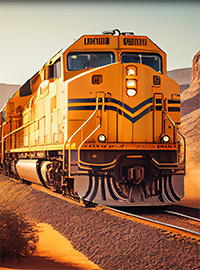| Railroads Are Overwhelmingly Safe, but Congress Wants More |
 |
|
By Veronique de Rugy
Thursday, June 15 2023 |
After many years of working in the policy world, I have concluded that politics is at most 10% about making the world better and safer. The rest is at least 45% theater and 45% catering to special interest groups. Further evidence for my assessment comes from the recent grandstanding in the U.S. Senate on rail safety. One reason why so much of what comes out of Congress is useless, if not straight up destructive, boils down to incentives. Politicians need something they can brag about when they seek reelection or election to higher office. Meanwhile, legislators are constantly surrounded by special interests who plead for government-granted privilege such as subsidies, loan guarantees, tariffs or regulations cleverly designed to hamstring competitors. Politicians rarely hear from the victims of their policies. Few voters can trace the origin of the higher prices they pay and the lower living standards they suffer. Enter the Rail Safety Act, a joint product of Sens. J.D. Vance, R-Ohio, and Sherrod Brown, D-Ohio. This bill, introduced in early May, is touted as a legislative response to the February freight train derailment in East Palestine, Ohio, that spilled toxic material, forcing people out of their homes and filling the air with toxic gas. Thankfully, no one was injured. But before anyone understood what truly caused the derailment – most likely a faulty wheel – politicians of all stripes were out promising new regulations to improve rail safety. The result is legislation with little connection to the derailment, or to any other derailments for that matter. Indeed, it appears to push pet projects that legislators wanted all along without any reckoning of costs and benefits. In consequence, says University of Dayton professor Michael F. Gorman in a new paper, none of the bill's detailed prescriptions and rules "would reduce the risk of a serious accident involving the transport of hazardous material. Taken together, they will likely result in an inferior outcome to the status quo." This is not surprising. What the bill does have is an awful lot in it for unions to like. For instance, it would freeze train crew sizes (the opposite of efficiency and something unions were demanding long before the derailment) and require more inspections that can only be performed by, you guessed it, union workers. These regulations might appeal to some people, but let's not pretend they will make the railroad industry more effective. Instead, they would make freight more expensive, potentially pushing more of it toward trucking (a dirty and more dangerous mode of transport). More frustrating is that none of these measures would prevent what is the leading cause of derailment in the United States – namely, human error. The solution to human error is more automation rather than more people. In testimony before the House Subcommittee on Railroads, Pipelines, and Hazardous Materials earlier in May, the Reason Foundation's Marc Scribner explained how rail safety can be greatly enhanced through automated track inspection and automated train operations. He also noted that the search for improved safety above and beyond what regulators require of the rail industry – improvement chiefly through automation – is already well underway. All of this casts quite a bit of doubt on the rhetoric surrounding the issue. After the bill cleared committee with just one other Republican vote, Vance suggested that without it, there would be another East Palestine incident. In reality, there will be other train derailments regardless of whether the legislation is enacted. The good news is that most of these incidents will likely be insignificant, as a vast majority of derailments are. This explains why we didn't hear much about derailments before East Palestine. As for rarer, more serious derailments, there's plenty of hope on that front. Whatever one thinks of U.S. railroads, sober analysis of the available data shows the industry is already overwhelmingly safe. This is especially true when juxtaposed against other modes of transportation, particularly trucking. My colleagues at the Mercatus Center have showed clearly that the number one input to improved rail safety is private investment, something railroads do pretty well. They do it to the tune of around $25 billion a year, and at about six times the level of the average U.S. manufacturer. Most of those manufacturers happen to be served by railroads, and many are darlings of the new Right and its policy agenda. Certainly, Congress could pursue policies to further improve rail safety. Instead, the American public is being railroaded by 50% pandering and 50% favoritism to unions. Veronique de Rugy is the George Gibbs Chair in Political Economy and a senior research fellow at the Mercatus Center at George Mason University. COPYRIGHT 2023 CREATORS.COM |
Related Articles : |
























